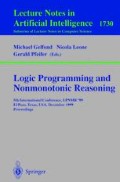Abstract
In “answer set programming”[5,7] solutions to a problem are represented by answer sets (known also as stable models), and not by answer substitutions produced in response to a query, as in conventional logic programming. Instead of Prolog, answer set programming uses software systems capable of computing answer sets. Four such systems were demonstrated at the Workshop on Logic- Based AI held in June of 1999 in Washington, DC: dlv1, smodels,2, DeReS3 and ccalc4.
Preliminary results appear in: M. Cadoli, L. Palopoli, A. Schaerf, and D. Vasile. np-spec: An executable specication language for solving all problems in NP. In Proc. of the 1st Intl. Workshop on Practical Aspects of Declarative Languages (PADL’99), number 1551 in Lecture Notes in Articial Intelligence. Springer- Verlag,1999.
Joint invited talk of LPNMR’99 and ICLP’99
Access this chapter
Tax calculation will be finalised at checkout
Purchases are for personal use only
References
Yannis Dimopoulos, Bernhard Nebel, and Jana Koehler. Encoding planning problems in non-monotonic logic programs. In Proc. European Conf. on Planning 1997,pages 169–181, 1997.
Henry Kautz and Bart Selman. Planning as satisfiability. In Proc. ECAI-92, pages 359–363, 1992.
Vladimir Lifschitz. Action languages, answer sets and planning. In The Logic Programming Paradigm: a 25-Year Perspective, pages 357–373. Springer Verlag, 1999.
Vladimir Lifschitz and Hudson Turner. Representing transition systems by logic programs. This volume.
Victor Marek and Miros law Truszczyński. Stable models and an alternative logic programming paradigm. In The Logic Programming Paradigm: a 25-Year Perspective, pages 375–398. Springer Verlag, 1999.
Norman McCain and Hudson Turner. Causal theories of action and change. In Proc. AAAI-97, pages 460–465, 1997.
Ilkka Niemelä. Logic programs with stable model semantics as a constraint programming paradigm. Annals of Mathematics and Artificial Intelligence, 1999. To appear.
V.S. Subrahmanian and Carlo Zaniolo. Relating stable models and AI planning domains. In Proc. ICLP-95, 1995.
Hudson Turner. Representing actions in logic programs and default theories: a situation calculus approach. Journal of Logic Programming,31:245–298, 1997.
Author information
Authors and Affiliations
Editor information
Editors and Affiliations
Rights and permissions
Copyright information
© 1999 Springer-Verlag Berlin Heidelberg
About this paper
Cite this paper
Lifschitz, V. (1999). Answer Set Planning. In: Gelfond, M., Leone, N., Pfeifer, G. (eds) Logic Programming and Nonmonotonic Reasoning. LPNMR 1999. Lecture Notes in Computer Science(), vol 1730. Springer, Berlin, Heidelberg. https://doi.org/10.1007/3-540-46767-X_28
Download citation
DOI: https://doi.org/10.1007/3-540-46767-X_28
Published:
Publisher Name: Springer, Berlin, Heidelberg
Print ISBN: 978-3-540-66749-0
Online ISBN: 978-3-540-46767-0
eBook Packages: Springer Book Archive

